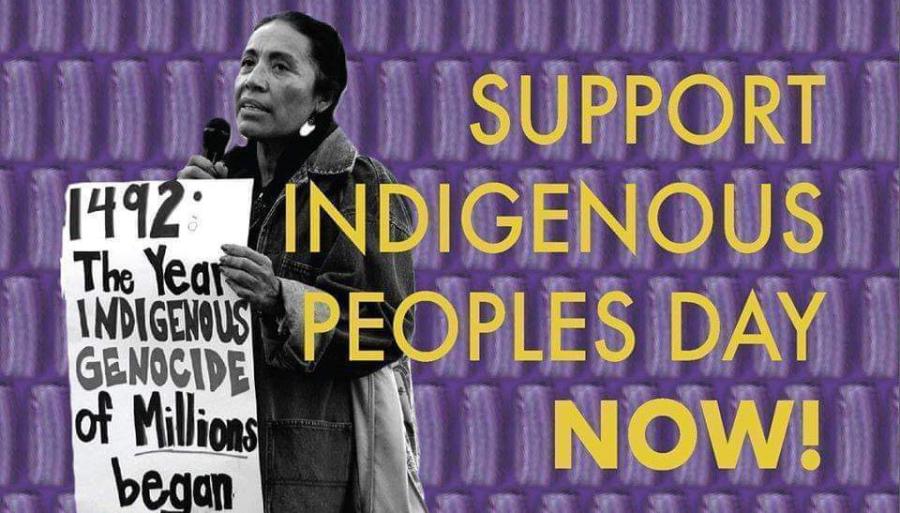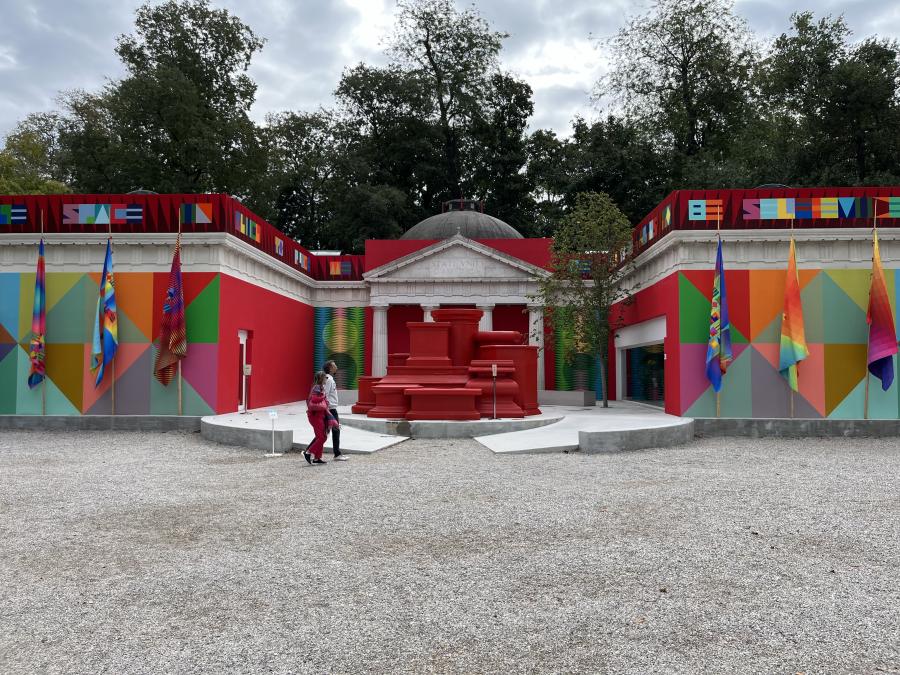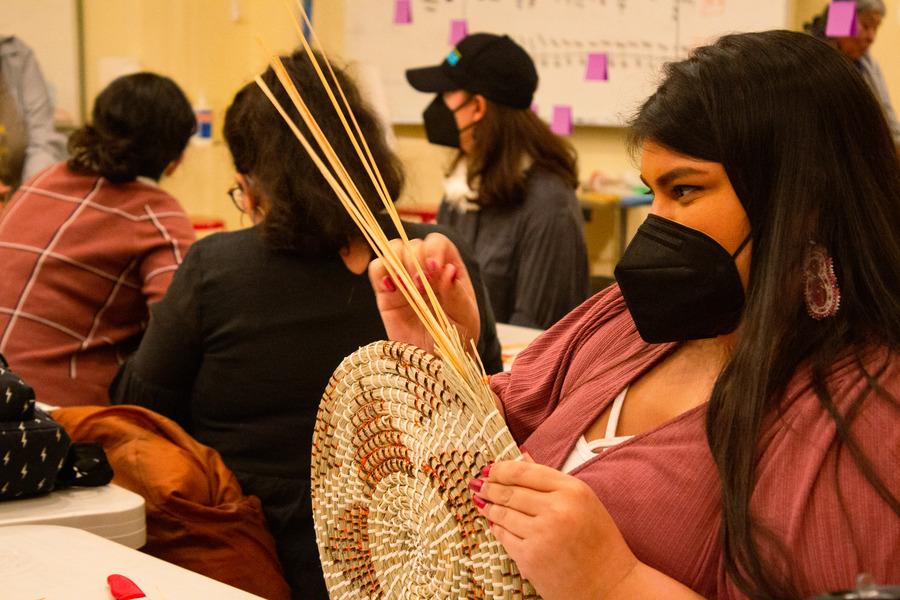The Ikwe Marketing Collective is a grassroots economic development project on the White Earth Indian reservation in northern Minnesota. The project, formed by a group of craftswomen, works to get a good price for crafts and wild rice and to encourage domestic/subsistence economic activities. The project, in collaboration with land rights organizing on the reservation (the Anishinabeg Akeeng project), is working to reclaim lands within the reservation borders, and to rebuild the traditional economic base of the community.
It's early morning on Big Chippewa Lake. An Anishinabeg couple pulls their canoe toward the water's edge. The woman boards, sitting on her haunches in the front of the canoe. The man pushes the canoe offshore and jumps in. It's misty as they pole toward the rice beds; they can feel the crisp dampness of September on their faces. The man in back stands, head just above the manomin (wild rice). The woman pulls the rice over her lap with one stick, and gently knocks it with a second. This is the wild rice harvest on the White Earth reservation.
The couple harvesting rice is probably unemployed and low income. They rely on rice sales (green and finished) to supplement their income. Unfortunately, when the major food companies "usurped" the wild rice crop from the Native people they also took the profits. Today on White Earth, Indian people are being paid 65¢ a pound for wild rice (green) when the retail value for that same rice is between $5 and $10 a pound.
Unfortunately, the rice you eat probably isn't from White Earth reservation and probably isn't harvested by Natives. Most commercial "wild rice" isn't wild rice, it's "tame rice," a hybrid version of zizania aquatica. Tame rice is grown in a diked paddy, with nitrogen fertilizers, fungicides, 2-4-D (a herbicide) and harvested with half-million dollar combines.
Spurred by a consumer view that wild rice is a gourmet product, the paddy rice industry came into being, beginning with 900 acres in Minnesota in 1968. By 1977, paddy rice represented over three-quarters of the commercially available "wild rice" crop. By 1983, 60 farmers produced about 3.2 million pounds of rice, with a wholesale value of $11 million. In total, some 95 percent of the rice mix retail market is in the hands of major food companies, and they are getting a very good price for their rice.
Meanwhile, back on the reservation, things are not so great. As a result of federal deviation from the 1867 treaty, signed with the Mississippi Chippewa (Anishinabeg), some 94 percent of the White Earth reservation is now under the control of non-Indian interests. With less than 6 percent of the reservation under Indian control, we have become like tenants in our own land. "No Trespassing," "No Hunting," and "For Sale" signs blanket a reservation once held in common. Our people are packed together in HUD (Housing and Urban Development) housing projects, surrounded by large non-Indian landholders. And, the socio-economic conditions of our community correspond to the intrusion on our way of life brought on by land alienation. Today unemployment hovers at 85 percent, 78 percent of our population is on some form of federal assistance, high school attrition is high, and Indian arrest rates are several times that of non-Indians.
The Ikwe Marketing Collective was formed in early 1985. Ikwe, which means "woman" in the Anishinabeg language, started as a group of craftswomen who were interested in getting a better price for our crafts. All to often, craftspersons have been forced to "hock" their crafts at the end of the month, at a very low price, just to get their family through the last week. We felt that our people deserved better.
We began by working with local retail outlets. We featured birchbark baskets, willow baskets, rag rugs, hand-tanned leatherwork and beadwork as our primary products, all produced by local women.
Our next project was the wild rice crop. We saw that the profits for our resources were going to others. Wild rice was given to the Anishinabeg by the Creator to feed and support us, and for as long as the Anishinabeg can remember our people have harvested rice. Today, we harvest rice, but fewer people can afford to eat it, since it must be "finished" by someone else - usually a non-Indian off reservation. Even fewer people are able to supplement their income in a meaningful way using the rice crop. The White Earth Anishinabeg have tried to get a good price for rice, but the technologically produced paddy rice has created an artificial ceiling on the price, driving our price down. The Ikwe Marketing Collective believes that wild rice, like native crafts, is a unique product, and deserves a good price.(*)
In 1986, we began a wild rice project, intended to purchase wild rice on the reservation at a good price, and then sell it directly to wholesalers and retailers. We marketed our rice as native-harvested, and directed sales to "socially conscious" consumers - specifically through a food cooperative in Minneapolis, and later by wholesaling through Friends of the Third World, a national marketing outlet. We have received between $4.50 and $5.50 a pound for our rice, and we plan to expand both aspects of our work - crafts and rice - in the years to come.
Economic Development On our Own Terms
"Development" in the context of Native communities is a loaded word. Development programs have meant the imposition of external models and the denigration of the existing economy on the reservation. "Development" all too often assumes that a community is "underdeveloped." Our community is "underdeveloped" because of the alienation of our land, and subsequently, the alienation of our resources - timber, produce and wild rice - to name a few. "Development" projects on White Earth have been essentially aimed at replacing what we have with something the Bureau of Indian Affairs thinks we should have. The failure of these efforts is reflected by our high "unemployment," low per capita income and high level of welfare "dependency."
Job programs train people for jobs that exist only for a short time, usually off-reservation. Worse still, such programs assume that our people are unskilled. When the short-term jobs end, people are recruited to new training programs, which lower our self-esteem.
We are skilled people. At the Ikwe Marketing Collective we believe that our traditional skills - maple sugar harvest, wild rice harvest, traditional crafts (basketmaking, beadwork, tanning, et cetera) - are highly valuable skills that others do not possess. These skills, combined with our resources, are a viable basis for economic development. This form of economic development is our best chance of changing the conditions of our community in the long term.
Our development work is based on two premises. First, domestic use, i.e., subsistence use, is a critical aspect of economic development. By consuming our resources, we get a "use value." This value - whether from eating wild rice or berries - is critical to a poor community. There may never be a job for every person on the reservation, so there may never be money to "enjoy" an American standard of living from wages. To feed our families, we might as well eat good Native food, instead of trying to get the money to buy "white" food. Finally, the subsistence sector of our economic actually provides a greater economic and social value to our people than does the wage sector. Thus, controlling production of our resources, on our own terms, is a cornerstone of rebuilding our self-reliance as a community.
The second premise for our development work relies on our "export" of resources. If we get a good price, our resources are valuable enough to provide a reasonable source of income for many families on the reservation. Furthermore, Native-harvested, instead of paddy rice from California, is increasingly in demand by the American public.
In the long term this development approach will strengthen our community because it enhances our indigenous economy. Finally, development work is part of our overall organizing effort which seeks - through legal and legislative approaches - the return of our land. According to federal investigators, our land has been illegally taken. Now - through one major lawsuit, a great deal of community work and ongoing lobbying in Washington - we plan to get it back. We understand full well that we cannot be a land-based community without land.
Who Supports Us?
The Ikwe marketing Collective is community based, but we have support form groups around the country. We are a non-profit tax-exempt organization through the sponsorship of The Youth Project, a national social-change-oriented, non-profit foundation. Our work has also been supported by the United Methodist Church, the Minnesota Women's Fund, the Onaway Trust (England), the Seventh Generation Fund (a national Native foundation) and the Funding Exchange, as well as other sources. We collaborate with other groups on and off the reservation who face similar problems and are sympathetic to our approach.
* There is a big taste difference between paddy or "tame rice" and native rice, largely due to chemical inputs and processing method. One visual difference is that most paddy rice is uniform in size and is close to black in color, while Native rice is usually in varied sizes, and varied shades of brown in color.
Article copyright Cultural Survival, Inc.



